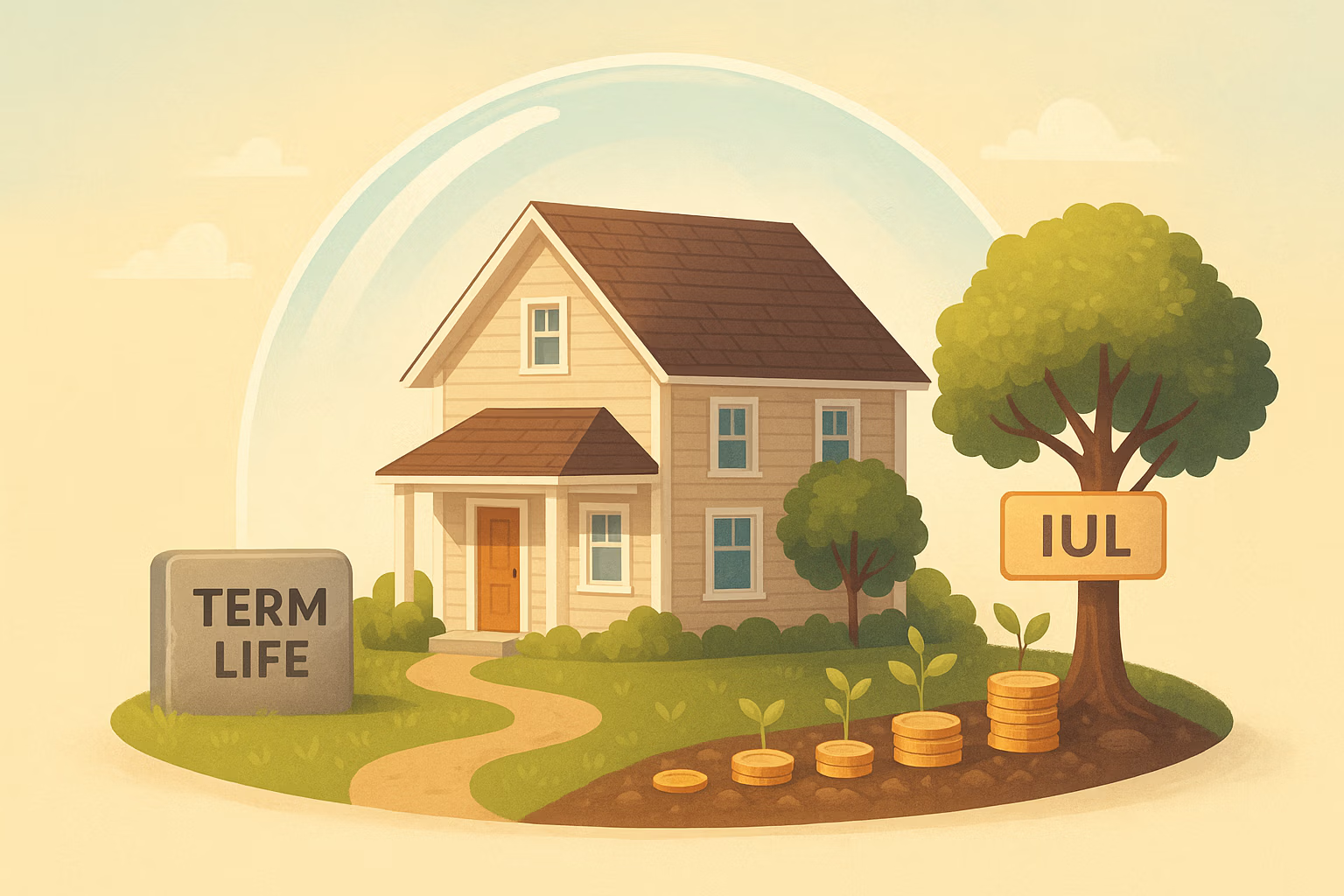
Buying a home is one of life’s proudest milestones. It represents stability, comfort, and the foundation for your family’s future. But as life often reminds us, things can change in an instant.
A few years ago, I learned that lesson firsthand. At 31, I thought I had plenty of time to “get around” to life insurance. I even already knew the answer to the question "What is mortgage protection?" But suddenly, I was hit with severe inflammation that affected my back, neck, and hips — eventually leaving me unable to walk without assistance. Overnight, I went from active and independent to relying on others for basic mobility. I later learned from the CDC that 1/4 people become disabled in the U.S. and 12.2% of people are mobility disabled. Odds that are higher than I initially thought.
That experience opened my eyes to something I wish I had taken seriously sooner: the importance of protection. Life insurance — and specifically, mortgage protection — isn’t just about planning for death. It’s about ensuring that when life takes an unexpected turn, your home and your family’s peace of mind remain secure.
So, what it Mortgage Protection? Mortgage protection is a life insurance policy designed to help your family pay off the mortgage if you pass away (according to the Center of Disease Control, the death rate in the U.S. is 922.9 per 100,000), or to support you financially if you experience a serious illness or injury (living benefits).
Unlike old lender-based plans that pay the bank directly, today’s mortgage protection policies are personally owned, which means the benefit goes straight to your loved ones, not your lender.
They can choose to:
Pay off the house completely
Continue making payments for financial breathing room
Use the funds for living or medical expenses
Or if it has living benefits, pay you if you get a qualifying critical, chronic, or terminal illness.
It’s designed to fit your family’s needs — not a lender’s rules.
Modern mortgage protection policies do more than cover your home balance. They include powerful living and financial features that make them incredibly flexible and valuable:
Level Death Benefit: Your coverage amount doesn’t shrink over time — your family receives the full value regardless of how much you’ve paid off. (Some mortgage protection plans have a death benefit that matches the mortgage as it gets paid down but I've found it's more beneficial to keep it level for most families so they don't have to keep getting new policies at higher rates as they get older and can choose to keep it or cash out after the mortgage is paid off or use it on the next one).
Living Benefits: Access up to around 80% of your coverage through term life and IULs, while you’re still alive if you experience a serious, chronic, or terminal illness. This can help pay for treatments, recovery time, or simply maintaining your lifestyle.
Return of Premium: Some plans return every dollar you’ve paid in premiums if you outlive the policy term.
Cash Value Growth (IUL Option): Indexed Universal Life (IUL) policies can grow cash value over time, linked to market performance but protected from downturns. This can become a savings or emergency fund later in life.
In other words — it’s protection that grows with you, not something that expires quietly.
For most families, the mortgage is the biggest monthly expense — and losing an income can turn that into the biggest stress. Mortgage protection helps ensure that your family never faces the fear of losing their home in the middle of a crisis.
Here’s what it provides beyond the obvious:
Security – Ensures your family has a safe place to live, no matter what happens.
Flexibility – Your loved ones decide how to use the benefit.
Dignity – Living benefits allow you to protect your lifestyle even when health challenges arise.
Peace of Mind – You can focus on recovery, not bills.
From my own experience, I can tell you that when your world suddenly changes, the last thing you want is financial uncertainty added on top. The right coverage gives you and your family the space to focus on healing and adjusting — not worrying about mortgage payments.
So now you know what is mortgage protection, here’s how a mortgage protection plan typically functions:
You select coverage that matches your mortgage amount (e.g., $300,000).
Choose your policy type:
Term Life: Affordable, simple coverage for 10–30 years.
IUL: Lifetime protection that builds value and can supplement retirement.
Whole Life: When IULs or Terms aren't an option.
Add living or return-of-premium benefits depending on what you'll be approved for and what your goals are.
Name your beneficiary — a spouse, partner, or family member. The person who will be picking up the pieces god forbid you pass.
If life takes a turn, the plan steps in:
If you pass away, your loved ones receive the full benefit.
If you’re diagnosed with a serious illness, you can use a portion while alive.
If you outlive your term with a return-of-premium plan, you get your money back.
It’s simple, flexible, and deeply personal — coverage that works with life, not against it.

Mortgage protection uses the framework of life insurance but adds features built specifically around homeownership and some policies require that a house was purchased within the last 2-5 years.
Feature | Mortgage Protection | Traditional Life Insurance |
|---|---|---|
Purpose | Focused on covering your home and family’s stability | Broader, covers all financial needs |
Benefit Type | Usually term life or IUL with living benefits. Can do whole life but generally expensive but can still be useful | Term, Whole, or IUL |
Payout Recipient | Your family (not your lender) | Your family or chosen beneficiary |
Living Benefits | Usually included (access up to ~80%) | Optional or limited |
Cash Value / Return Options | Available on select plans | Common in permanent coverage |
Flexibility | Built for mortgage and income protection | Broader, less mortgage-specific |
Both can work together — many families use mortgage protection alongside a separate life insurance plan for full coverage.
Mortgage protection is a smart choice if you:
Have a family with dependents or a partner relying on your income.
Would struggle to cover the mortgage if a major illness or death occurred.
Prefer coverage you can access while alive.
Want predictable, affordable protection tied to your biggest investment.
Appreciate options that can grow in value or refund premiums.
It’s not just a policy — it’s peace of mind in paper form.
When I went through my health challenges, I realized that protection isn’t about expecting the worst — it’s about being ready for life’s surprises. If I had mortgage protection or strong living benefits in place at that time, I could have handled my recovery with less stress and more independence.
That realization completely changed how I view insurance. It’s not about death; it’s about life. It’s about keeping your home, your family’s stability, and your dignity intact no matter what happens next.
Now, when I help people choose coverage, I don’t just look at numbers — I look at the human side of it. Because I’ve lived through the uncertainty. I know how much difference one policy can make.
What is mortgage protection? Mortgage protection is one of the most powerful tools for safeguarding your home and your family’s future. Whether you choose a Term Life plan for simplicity or an IUL for lifetime growth and flexibility, the right policy provides something irreplaceable — stability when life gets unpredictable.
If you’re a homeowner, take time to explore your options and get with a broker that has access to multiple carriers so that they can get the best plan for you and your family. We can do it (click here) but if you have a broker you trust, that's fine too as long as they are looking out for what's best for you.
Can a life insurance beneficiary be a minor? Yes — but children can’t legally receive the payout directly. This guide explains what really happens, how to avoid court delays, and the safest ways to leave life insurance to a child using a custodian, trust, or designated adult. Perfect for parents, guardians, and godparents planning ahead.
Permanent Life Insurance offers more than coverage — it’s a lifelong plan for stability and peace of mind. With guaranteed protection, level premiums, and tax-deferred cash value, it helps you safeguard your family and build financial strength that lasts a lifetime.
Difference between term and whole life insurance. Choosing between term and whole life insurance can shape your family’s financial future. This guide breaks down the differences, pros and cons, and proven strategies for both.
What is whole life insurance? Whole life insurance offers more than just lifelong coverage—it builds cash value, creates wealth opportunities, and provides lasting protection. This guide explains what a whole life policy is, how it works, and strategies for making the most of it.
Final expense insurance—also called burial or funeral insurance—provides affordable, permanent coverage for end-of-life costs. This guide explains how it works, what it covers, and why it can ease the financial burden on your loved ones.
What is an IUL? Indexed Universal Life (IUL) insurance combines lifelong protection with market-linked cash value growth. This guide explains how an IUL works, its pros and cons, and strategies for using it as part of a financial plan.
What is term life insurance? Term life insurance is simple, affordable coverage that protects your family for 10–30 years. This guide explains how it works, its pros and cons, and strategies for using it.
What are living benefits? Living benefits turn life insurance into more than just a death benefit. They let you access funds while alive if you face illness or long-term care needs. This guide explains what living benefits are, how they work, and secrets on how to make them work for you.
Life Insurance 101 covers everything you need to know about protecting your family. Learn the basics of term, whole, IUL, final expense, mortgage protection, and living benefits—all explained simply with strategies for choosing the right policy.
Is Life Insurance Taxable? Most life insurance payouts are tax-free, but there are exceptions. This guide explains when life insurance is taxable, when it isn’t, and strategies to protect your family from unnecessary taxes.
Can a life insurance beneficiary be a minor? Yes — but children can’t legally receive the payout directly. This guide explains what really happens, how to avoid court delays, and the safest ways to leave life insurance to a child using a custodian, trust, or designated adult. Perfect for parents, guardians, and godparents planning ahead.
Permanent Life Insurance offers more than coverage — it’s a lifelong plan for stability and peace of mind. With guaranteed protection, level premiums, and tax-deferred cash value, it helps you safeguard your family and build financial strength that lasts a lifetime.
Difference between term and whole life insurance. Choosing between term and whole life insurance can shape your family’s financial future. This guide breaks down the differences, pros and cons, and proven strategies for both.